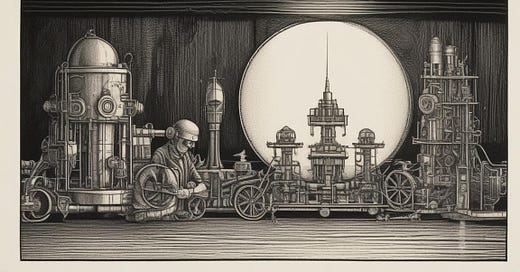TFT: We Will Innovate – We Always Have
Lessons from History: How Innovation Solves the Biggest Problems
History shows that humanity has always found ways to innovate out of crises. From New York City’s streets once being clogged with horse manure to the rise of technological revolutions, we continually face seemingly insurmountable problems and find innovative solutions. Do you need to be aware of the impact on the world around us? Of course. But keep in mind that we have also always found ways out of challenges that we have faced in the past. Yes, innovation will be part of our solution for a better tomorrow. How do I know that? We’ve done it before.
Sinking in Horse Manure
Before automobiles we had horses and that was a great improvement on our ability to get around. But as we moved into cities we started concentrating more and more horses in one area. We did not have horse bathrooms or plumbing in the stales. That means these horses were just shitting on the street. And pretty soon that became a huge problem. In the late 1800s, large cities like New York and London faced severe pollution problems due to horse-drawn carriages. By the 1890s, it was estimated that horses in New York produced 2.5 million pounds of manure daily, leading to sanitation crises (source: History.com). That’s obviously not good for the living conditions in the city. Surely the experts of the day had a solution, right? Nope. The "Great Horse Manure Crisis of 1894" was seen as an unsolvable urban problem. How would we get away from all this horse shit? Innovation baby, innovation.
By 1912, just over a decade after cars were introduced, the number of registered cars in New York surpassed the number of horses. And thus the horse shit problem was eliminated. Now I know one could argue that cars are worse than horse, but keep in mind we’re not done innovating yet. Also the cars of today are much cleaner than the cars of 1912. We’ve also added systems like subways, busses, and bikes to the mix as well. We’re not sinking in horse shit thanks to…innovation.
Cars Did Not Just Replace Horses
Cars not only solved our horse shit problem but they also led to other great innovations as well. Consider, the internal combustion engine, which ultimately solved the horse manure crisis, was patented in 1876 by Nikolaus Otto (source: Encyclopaedia Britannica). By the early 1900s, the first automobiles were already transforming cities and alleviating the transportation issue.
Moving from horses to cars revolutionized urban planning, leading to the development of highways, suburbs, and the modern transportation systems we rely on today. In just a matter of basically a decade we were able to completely change the way we lived in and around cities, that is to the internal combustion engine. We continue to see innovation like this today. We’re not reinventing what cities should look like to fit our current needs. Often times fewer cars, more pedestrians, public transportation and hopefully green spaces. We never know the full effect of an innovation in the short term, but know that we continue to innovate off the innovation, so yes some jobs will be replaced, but new jobs will be created. Keep thinking about those horses that were replaced, no need for a blacksmith making horse shoes, but now we need mechanics to fix the engines and tires for the cars. Innovation also brings opportunity.
We Will, We Will… Innovate!
As we continue forward innovation will come and history says it will follow crisis. For example, the COVID-19 pandemic accelerated digital transformation by up to seven years in just months, as companies adopted new digital technologies for remote work, customer interactions, and supply chains (source: McKinsey). Nothing pushes you to innovate faster than a crisis. Innovation will continue and a crisis will accelerate it. Today, issues like climate change, urbanization, and technological disruption present opportunities for the next wave of groundbreaking innovation. We will continue to innovate just as we always have. So be prepared for innovation and continue to learn about new technologies. You never know when you will need that for your next job. Also keep in mind that it’s good business to innovate. Companies that invest in innovation during times of crisis are 30% more likely to outperform their competitors in the following decade (source: Harvard Business Review).
Action Step
Where does your company need to innovate? Where does your industry need to innovate? Take 30 mins this week to think on those questions. Then pick one innovation you can trial next week.
Additional Reading
"How Innovation Has Transformed Cities: From Horses to Smart Cars" – World Economic Forum
"The Power of Innovation in Crisis: Lessons from History" – Harvard Business Review
"The Role of Innovation in Addressing Global Challenges" – Forbes




